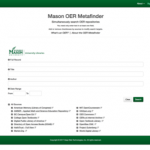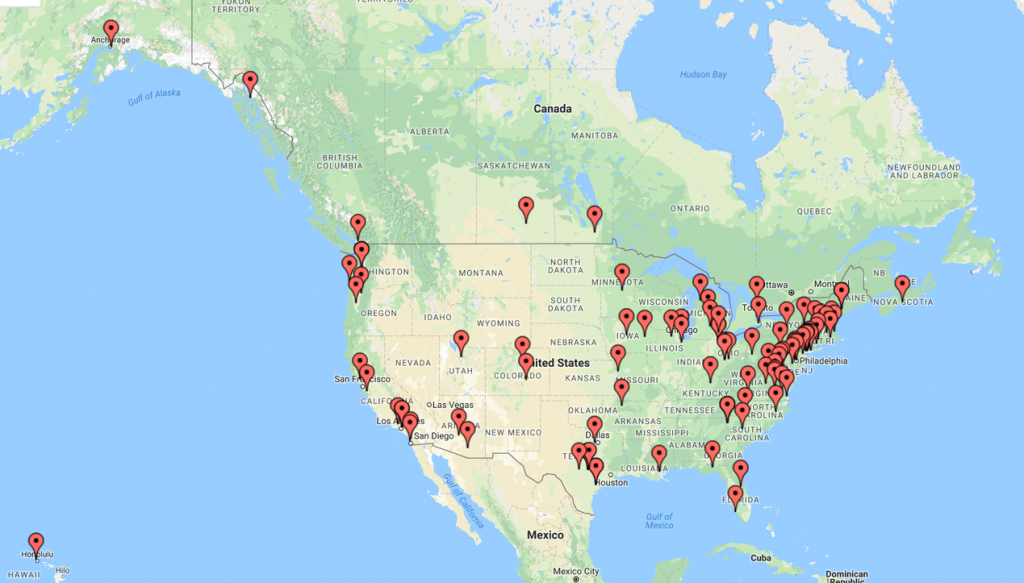 I am a relative newcomer to the topic of OERs (Open Educational Resources). Not unaware of the topic—our Mason Publishing Group has been working with faculty interested in affordable educational materials for some time now—but until late, I haven’t really been terribly involved in those efforts.
I am a relative newcomer to the topic of OERs (Open Educational Resources). Not unaware of the topic—our Mason Publishing Group has been working with faculty interested in affordable educational materials for some time now—but until late, I haven’t really been terribly involved in those efforts.
That changed one afternoon this summer as I grabbed my laptop and tagged along with them to a meeting with the Associate Provost for Undergraduate Education to talk about OERs.
As the meeting progressed (and moved ever further from my area of expertise) I started stealing moments to jump in and out of various OER aggregation sites, curious to see the sorts of resources already available on the net.
If you’ve spent much time with OERs, you won’t be surprised to hear that I discovered:
- many dissimilar aggregations of content;
- so many wildly-different interfaces;
- so much duplication across these aggregations;
- and such inconsistent metadata.
As I poked around, I could easily envision a faculty member—excited by idea of OERs—feeling the enthusiasm drain away as she dove in and out of the various content silos. Soon I found myself thinking much less about OERs and far more about how to improve their discoverability as a way to improve OER adoption…
Already familiar with Deep Web Technologies Explorit software (we use it for a number of local search engines like our popular Sciences Metafinder), I realized that discovery of OER materials presents a problem that’s tailor-made for a federated search solution. Looking across OER sources we find:
- a large number of search targets (a federated search would save hundreds of clicks),
- and fortunately each site is more-or-less focused (that’s good, minimizes noise in retrieval sets).
- We see redundant content across many of these sources (de-duping retrieval would be a huge win, too bad eccentric metadata makes that difficult), and
- there’s a vertigo-inducing variety of search interfaces (distilling that to one would be great, wouldn’t it?).
Beyond improving the discovery process, I realized building our own search engine would also give us the opportunity to take a more expansive view of what constitutes an OER–by searching the more common OER repositories but also hitting sites that offer quality, open educational content even if that isn’t their sole or even primary purpose. Sites like DPLA, HathiTrust (of particular value where the educator belongs to a HathiTrust member institution), Internet Archive, and World Digital Library to name a few.
I pitched the idea to Deep Web Technologies. Abe Lederman, CEO was very enthusiastic and offered to help us turn the idea around quickly. True to his word, within just a few weeks we had a powerful OER discovery service ready to go.
The Mason OER Metafinder launches…
I tweeted once or twice about the Metafinder’s existence and shared the link with a few people…but outside Mason we weren’t seeing much interest or activity. Some weeks later, Deep Web posted a story about the OER Metafinder on their tech blog. That was picked up by Information Today and other corporate PR news sites and the Metafinder began to build a small audience but still nothing dramatic. I didn’t feel we had failed exactly–the metafinder was impressing local audiences–but I was certainly disappointed. We couldn’t seem to get what I considered a great tool more widely used.
Three or four weeks passed then one morning I saw a message from Abe Lederman in my inbox, subject “OER Metafinder going viral?” Abe said they had seen a spike, hundreds of hits, on the Metafinder in the past two hours–mostly from the Northeast US. He asked, “Any idea why?”
I didn’t have a clue but later that afternoon, I got an email mentioning this post on the SPARC Libraries and OER Forum earlier in the day:
I don’t remember seeing this announcement on any of our OER lists last month, or at OpenEd, but one of our library liaisons just forwarded it to me. It’s the announcement of an aggregated OER search engine created by George Mason and a web tech company, which looks, on the face of it, to be a “Google for OER”. It searches many open archival/book repositories (DPLA, HathiTrust, Internet Archive) as well as the standard OER ones (Merlot, OTL, OpenStax, etc.) and has some great limiters to narrow down results. Congrats GMU!
This unsolicited mention on a listserv aimed at precisely the right group of people proved catalytic. Within two days, I searched the LibGuides community site and found 28 institutions already linking to our OER Metafinder. Noticing that it was catching on with LibGuides users, I added sample search widget code to our “About the Metafinder” page. Searching https://community.libguides.com and crawling the web with DEVONagent Pro (a great personal research app for Mac, by the way), I see that just a few weeks after Abe’s initial “gone viral” email there are already more than 100 sites linking to our Metafinder.
7/2019 update: We now have 348+ sites linking to MOM

